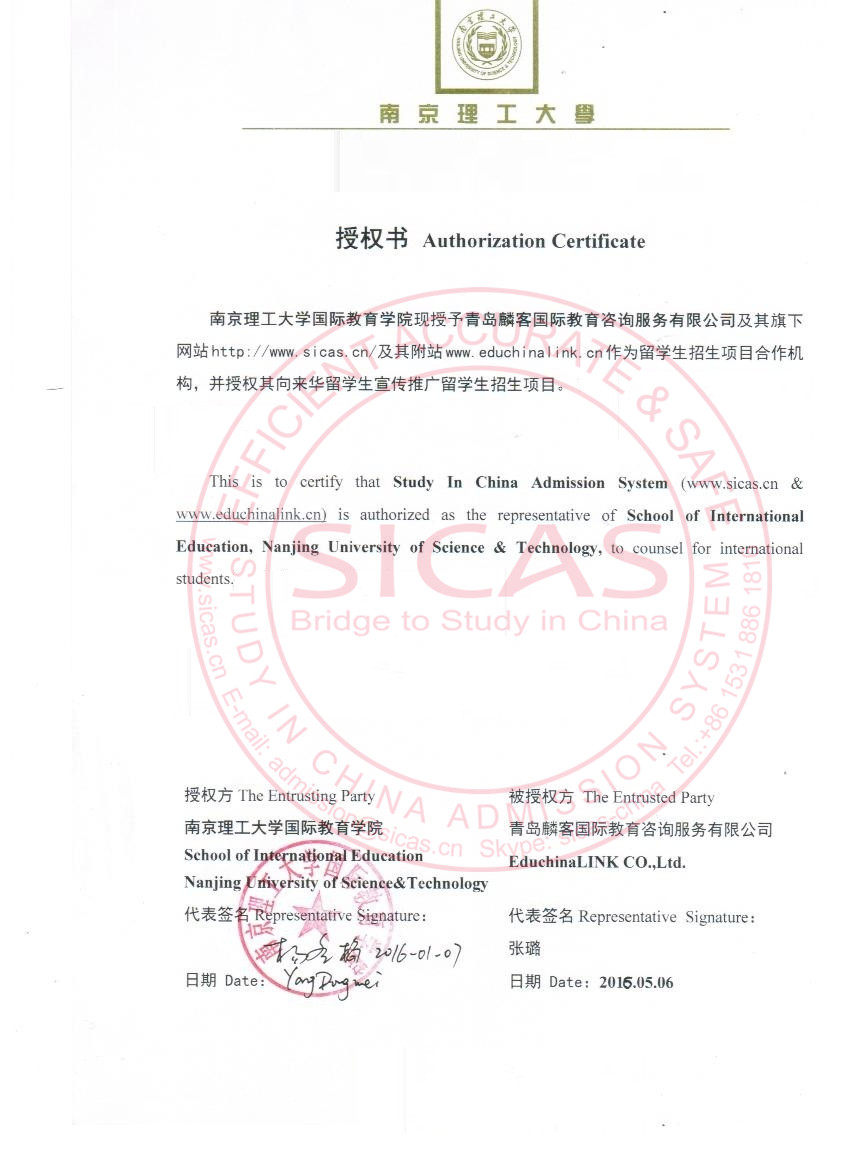|
|
Biochemical Engineering(in English)
|

|
|
|
Teaching Medium:
|
English
|
|
Degree Awarded:
|
Master's Degree
|
|
Entry Requirements:
|
Bachelor's Degree
|
|
Duration:
|
2.5 Years
|
|
Starting Date:
|
Sep.2025
|
|
Application Deadline:
|
Jul 01, 2025
|
Tuition Fee:
|
CNY 36,000 per year
|
Application Fee:
|
150 USD (Non-Refundable)
|
|
HSK:
|
Level 0
|
|
Schools:
|
Other
|
1. Introduction
The Biochemical Engineering program at the Nanjing University of Science and Technology (NUST) belongs to the primary discipline of Chemical Engineering and Technology that is authorized by the State Council to offer master’s (M.S.) and doctoral (Ph.D.) degrees. This program started to recruit undergraduate students in 1997, and was authorized to establish a research center for postdoctoral fellows a year later, resulting in a complete training system covering B.S., M.S., Ph.D. and postdoctoral research. We have a highly qualified and distinguished group of faculty, some of whom are recipients of a number of awards including the Plan for One Thousand Talents, the National Science Fund for Outstanding Young Scholars, the New Century Excellent Talents funded by the Ministry of Education, and Distinguished Professors funded by Jiangsu Provincial Department of Education. The faculty members have excellent expertise in the areas of biological resources utilization, molecular metabolism/function, and biosensors design/characterization.
2. Research Directions
(1) Biological resource engineering focuses on discovering biological resources
from animal, plant and microorganisms and extending to advanced applications of
biological active materials. In general, the research projects include extraction,
isolation, structural characterization, and chemical modification of important natural
products followed by biological activity assays.
(2) Microbial fermentation and metabolic engineering focuses on developing
breeding techniques for industrial microbial strains, metabolism control, genetic
engineering, cell cultivation techniques, and engineered antibody design.
(3) Biocatalysis and biotransformation covers structure-function studies of
biomolecules, developments in bio-separation and bio-determination techniques,
developing environmentally friendly bio-energies, bio-chemicals, and bio-medicines,
as well as detoxifications/biodegradations of environmental pollutants.
(4) Biosensors focus on the design and characterization of bio-fuel electrodes,
bio-nanomaterials and biosensors.
3. Duration of studies
Full time master students are expected to complete their studies and earn their
degrees in 2.5 to 5 years, and they will be disqualified from the program after 5 years.
4. Credits requirements
Students are required to complete at least 28 degree credits from courses in Section 5 with a minimum of 26 coursework credits and 2 obligatory courses.
5. Curriculum

6. Thesis Topic and Proposal
A master student is supposed to choose his/her research direction under an advisor’s guidance. The student should actively study, research and survey in the chosen research direction. The student is expected to choose a research topic for the postgraduate thesis and confirm the significance of the topic in a thesis proposal. The thesis proposal should be submitted and defended at the beginning of the second year of study.
Detailed regulations and requirements on master's thesis can be found in the "NJUST Regulations about the Topic Selection, Research Proposal and Composition of Postgraduate Theses and Dissertations".
7. Publication
Before graduation, each master student should have at least one academic paper published or accepted for publication. Detailed requirements are documented in "NUST regulations on a postgraduate’s publications of their research work".
8. Degree Thesis Requirement
MA Degree thesis is one of the most important parts for graduate education, which provides students with training on academic research or specific technology application, enhances students’ abilities to innovate and to apply the knowledge to their research, and encourages them to discover, analyze and solve problems in their fields.
Detailed regulations and requirements on master's thesis are documented in the "NJUST Regulations about the Topic Selection, Research Proposal and Composition of Postgraduate Theses and Dissertations", and "NUST Style Sheet for Theses and Dissertations". For a joint effort with others, or a follow-up of previous work, the student should clearly specify his/her contribution to the thesis.
1. Non-Chinese citizens with a valid passport
2. Have attained bachelor degree
3. Be in good health condition and under the age of 35
4. Observe the law and regulations of People's Republic of China and all regulations of the university
1. Photocopy of valid passport
With name, passport number & expiration date, and photo included.
2.Passport-sized photo
A recent passport-sized photo of the applicant.
3. Bachelor's degree diploma
Graduation certificate should be in Chinese or English. If not, it should be translated into Chinese or English and be notarized.
4. Transcript of undergraduate school
Transcript should be in Chinese or English. If not, it should be translated into Chinese or English and be notarized.
5. Certificate of English proficiency test
It is better to upload your IELTS or TOEFL results when you are applying for a course taught in English, especially for those non-native English speakers, even though it is not a compulsory condition in some of the universities.
6. Two letters of recommendation
From professor or associate professor or equivalents.
|













